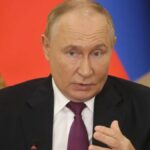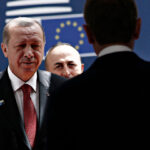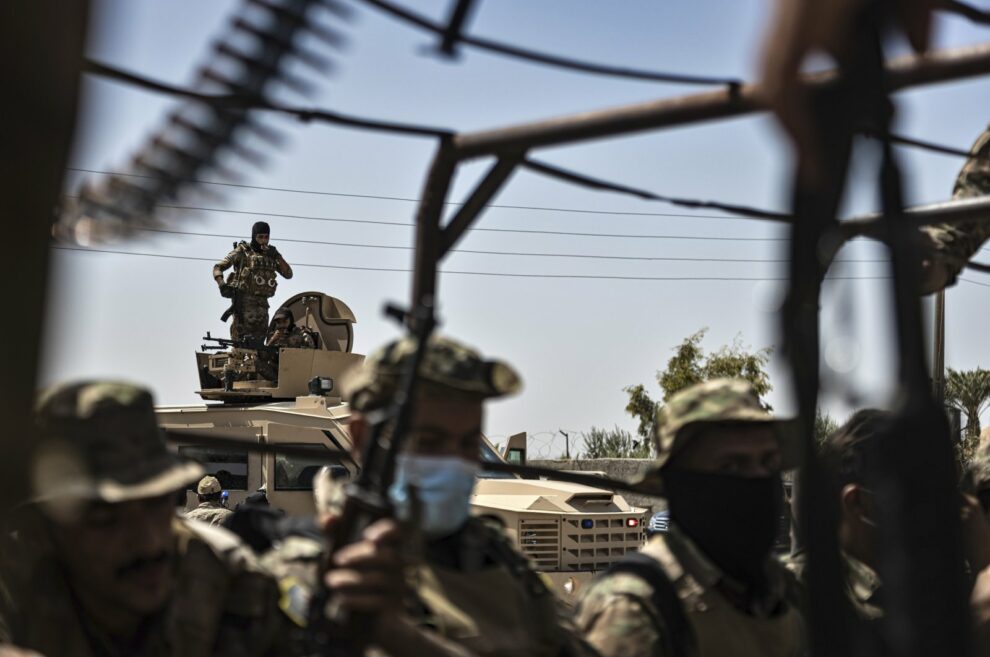Robert Ford, the last U.S. ambassador to Syria, believes the U.S. administration is not ready to give up on the PKK/YPG terrorist group despite Türkiye’s security concerns
The Biden administration will not abandon the PKK/YPG terrorist group any time soon, Robert Ford, former United States ambassador in Damascus, says. Ford stated that the group is still viewed as a “local partner” in the region.
“I believe the support will linger. The Biden administration insists upon keeping U.S. forces in Syria’s east and they need a local partner for this,” he said in an interview with Anadolu Agency (AA).
“It has been a partner for a decade. Washington knows Türkiye is not pleased with this partnership, but they won’t change their stance,” he said. Ford stated that PKK/YPG cannot help eliminate the Daesh terrorist group permanently, though they are armed by the U.S. for that purpose.
Touching upon Republican Senator Rand Paul’s resolution to remove all U.S. troops from Syria within a month, Ford said only 13 senators voted yes. “It indicates a strong political support for U.S. military presence in eastern Syria. Interestingly, people from (both sides of the political spectrum) from Bernie Sanders and Elizabeth Warren to Christopher Murphy, supported the resolution.
The YPG, the Syria wing of the PKK, which is recognized as a terrorist group by the U.S., is known for receiving open support from Washington under the pretext of the “fight against Daesh.” But photos and videos of terrorists shared by PKK-linked social media accounts show U.S. “aid” is not limited to those in Syria.
As they show off their recruits, the PKK also reveals U.S.-made weapons, from M16 and M4 rifles to thermal binoculars. One such video recently shared showed a nine-person PKK cell making preparations for an attack against the Turkish Armed Forces (TSK) as they carry U.S.-made rifles. The video says PKK members will target Turkish troops in Iraq’s north.
The U.S. Army frequently provides military training and supplies to members of the PKK/YPG terrorist group in bases in Syria located in the Mount Abdulaziz region of Hassakeh as well as in the eastern al-Omar oil field and Conoco area of Deir el-Zour province, all regions occupied by the terrorists, which Washington calls its “partner forces.” In August, it deployed more reinforcements to U.S. bases in the region as a convoy of nearly 50 trucks, tankers and armored trucks delivered fuel, weapons and ammunition to the U.S. forces stationed at the natural gas and al-Omer oil fields.
Since the start of the year, the U.S. Army sent reinforcements to bases and stations in Tal Beydar and Ash Shaddadi on Jan. 6, 8, 22 and 25, again on June 19 and 20, and July 11. In July, days after President Recep Tayyip Erdoğan called on Türkiye’s NATO allies to take a concrete stance against all terrorist groups, the U.S. House of Representatives approved a military spending bill that ensured continued funding for the YPG and authorized the continuation of joint operations from the end of 2023 through the entirety of 2024. The bill encompasses all Syrian groups, including the PKK/YPG. It would also include funding for non-PKK/YPG groups, including local Syrian military forces at a strategic U.S. military installation along the Syria-Jordan-Iraq border.
The PKK has been waging a bloody terror campaign against Türkiye since the 1980s, and it’s considered a terrorist group by Ankara, the U.S. and the European Union. Its terrorists have established safe havens in northern Iraq and Syria and frequently launch attacks on Turkish soil and local areas. They have been responsible for the deaths of over 40,000 people, including women, children and infants.
Despite Ankara’s documentation of the fact that the YPG and PKK are, in actuality, the same terrorist group, consistent U.S. support for the terrorists remains a source of significant strain between the allies.
Since 2016, Ankara has been leading counteroffensives against the terrorist groups and striving to establish a 30-kilometer-deep (19-mile-deep) security line, for which Russia and the U.S. committed to providing support in October 2019. The same month, Türkiye launched its Operation Peace Spring against the PKK/YPG and Daesh, another terrorist group, in northern Syria, with Washington promising that the YPG would withdraw from the region.
The U.S. military then evacuated all its bases in the area, prioritizing stationing near oil fields. It, however, maintained its support, namely military training and truckloads of equipment, to the terrorist group under the guise of a joint fight against Daesh. It also conducts regular patrols with the PKK/YPG.
However, an inevitable confrontation between Türkiye and the U.S. took place a few months ago. The U.S. forces downed an armed Turkish drone in northern Syria as it was tracking terrorists. “There is no doubt that the incident has been engraved in our national memory and necessary action will certainly be taken when the time comes,” President Recep Tayyip Erdoğan has said following the incident. Türkiye has stepped up its cross-border operations against PKK after the terrorist group tried to storm the police headquarters in the Turkish capital on Oct. 1. The Pentagon has termed the incident “regrettable,” while the Turkish Foreign Ministry said in a brief statement that it lost the drone “due to different technical assessments of de-confliction mechanism run by third parties.”
Erdoğan, in October, said Turkish security forces have been meticulous to ensure nobody except terrorists would be targeted during the operation. “Yet, we could not prevent this unpleasant or ‘regrettable’ incident (as the U.S. described),” he said. The president highlighted that Türkiye’s counterterrorism fight, which began 40 years ago, was being carried out on “principles,” and it was largely taken beyond Turkish borders as part of a strategy to eradicate the terrorism at its source.
Thanks to U.S. help worth millions of dollars, the YPG has grown stronger in northeastern Syria, despite Washington’s promises to Türkiye that it would “consult and work closely” with Ankara against Daesh and the PKK.
Erdoğan said in October at a news conference that they have called on the “powers” maintaining relations with terrorist groups in the region “for years” to keep their military and intelligence elements away from terrorists “so that they would not be harmed in our operations.”
Before Erdoğan’s remarks, Foreign Minister Hakan Fidan warned third parties, without naming them, to stay away from PKK/YPG facilities. “Our armed forces’ response to this terrorist attack will be extremely clear. They will once again regret committing such actions,” he warned.
Source: Daily Sabah















